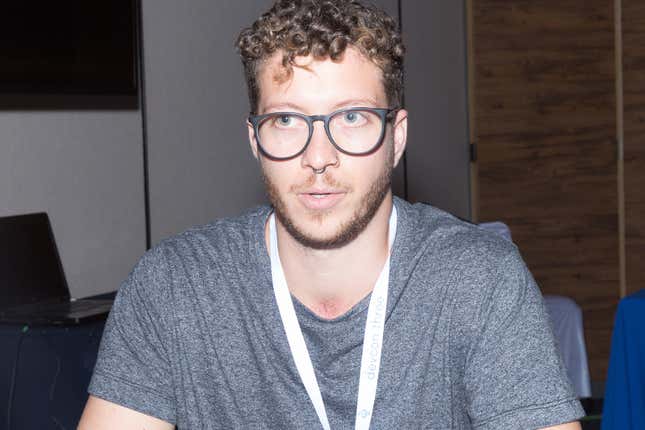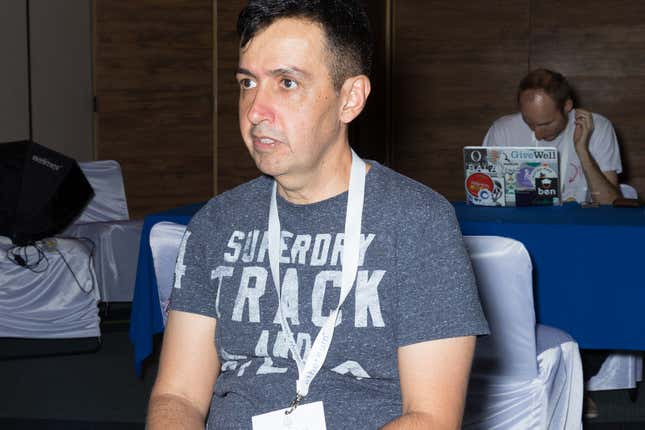Cancún, Mexico
Popular petitions are an integral, but impractical, part of Brazil’s already complex electoral system, which has been blamed for plunging the country into a political crisis. Such petitions in their current form present an intractable logistical problem: How to collect and verify signatures from 145 million voters across a landmass larger than the mainland United States?
Brazilian legislators now are turning to ethereum to solve that issue in one of the first uses of a cryptocurrency by a political system. The project is spearheaded by an unlikely pair: Ricardo Fernandes Paixão, a soft-spoken legislative adviser at the Brazilian congress and a university lecturer, and Everton Fraga, a nose-ring sporting designer and programmer with the Ethereum Foundation. Both were in Cancún last fall, attending the annual conference for programmers interested in the ethereum world, DevCon.
The duo want use the ethereum blockchain to prove that signatures collected for petitions to the Brazilian congress exist. This is important because any petition, or projeto de lei de iniciativa popular, that gets signatures from 1% of the electorate must be heard in congress, a requirement enshrined in the Brazilian constitution. Brazil hasn’t fulfilled this constitutional promise, says Henrique Araújo Costa, a law professor at Universidade de Brasília.
“In part this is due to the absence of a platform that can securely collect the signatures of one percent of voters,” Costa says. ”We’ve been through a sort of crisis regarding the legitimacy…of our laws.” The blockchain project is part of a wider package of electoral reforms to strengthen instruments of direct democracy (pdf).
Collecting signatures by hand
Gathering signatures from Brazil’s huge population of over 207 million people, of which 145 million are on electoral rolls, is an expensive and complex affair. “Although the popular initiative does exist, there is no secure way to collect people’s signatures so people can propose bills themselves,” says Araújo Costa. Even if the signatures were successfully gathered, verifying them is practically impossible, says Tiago Peixoto, a World Bank specialist in using technology for civic ends.
Popular petitions thus face a double hurdle before they get their day in congress: Gathering enough support, and then finding a legislator to “adopt” them to be presented as his or her own bill in congress. “This is a workaround solution necessary due to the impossibility of verifying the authenticity of the signatures,” Peixoto says.

As a result, popular petitions have little chance of being heard in congress, much less passed as law. Only four laws that originated as petitions have been passed. But they have been important ones, Peixoto says. He singles out the 2010 “clean slate law,” which prevents convicted politicians from running in elections, as an example.
Popular petitions also force lawmakers to address issues that the political establishment may shy from, says Araújo Costa, the law professor. “Popular [petitions] always arise on very sensitive themes,” he says. ”If we do not overcome this security issue regarding the collection of signatures, we will still be further from achieving the exercise of citizenship that our Congress promised decades ago.”
Serving up signatures on a blockchain
How does ethereum, a blockchain network that touts itself as a “world computer” because it can harness machines dispersed around the globe to collectively run programs, solve a Brazilian electoral problem? The answer is that only really being used for one, relatively simple, function: To let someone check that their signature really is attached to a particular petition.
Here’s how it works: An mobile-phone app for digital signatures is being developed by the congress. This system will also have an application programming interface (API) that third-party app developers can use. Brazilians register their details with the app, then gain the ability to sign a petition, or submit a petition. The app keeps track of the number of signatures per petition.
Once a day, the list of names supporting a particular petition are put through a cryptographic process called hashing, which results in a scrambled string of characters. The special thing about hashing is that it’s a one-way process: Someone can check that their name was an input to the hashed string of characters, confirming that she’s been counted in the petition; but he or she can’t reverse the process to show the list of supporters.

This daily hash is then attached to an ethereum transaction, which in turn is added as an entry to the ethereum blockchain. The ethereum blockchain is supposed to be a permanent record of all the transactions ever conducted with ether. It’s also decentralized, meaning copies are held by thousands of computers running the ethereum software around the world, just like its older cryptocurrency cousin bitcoin. This makes it difficult, if not impossible, to tamper with.
Brazilians can then look up the hash on the ethereum blockchain and check that their names have been added to it. They can do so using an app provided by the government or one of the many free “blockchain explorer” websites that ethereum enthusiasts have built, such as Etherscan. “Anyone can audit the system,” says Paixão, the congressional legislative adviser. “Each day, you can prove from cryptographic proof that a certain signature is already there.”
“A celebration of democracy”
If the system takes off, it would mean Brazil’s popular petitions are secured by a global, decentralized, public blockchain. That may be one of the first instances of a government working with a so-called public blockchain instead of implementing a private, proprietary, version, such as Sweden’s blockchain-powered land registry. Paixão says he’s been developing the project since the beginning of 2017, but is still waiting for legislative approval to launch it.
In the Brazil that Paixão and Fraga want to build, signatures would no longer be gathered by hand and records transported by truck, which Paixão says is the current method of getting support behind a petition. Instead, proposals would be signed by app and records served up to public scrutiny on a blockchain.
“It would be a celebration of democracy,” says Fraga, who is Brazilian. “With this project, we are doing what the constitution says, but in practice, it hasn’t [yet] happened.”
High-flown notions of blockchain tech changing society are common in the cryptocurrency world, but few have managed to take hold when faced with hard realities. Peixoto, the World Bank specialist, points out that online voting measures haven’t significantly increased voter turnouts in other countries. For Brazil’s popular petitions, whether ethereum-audited signatures will have the intended effect remains “an empirical question,” he says. The proof, it seems, will be on a blockchain.
